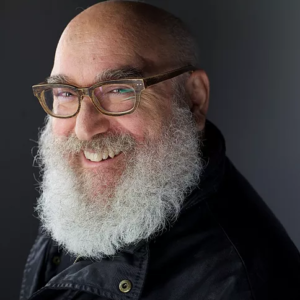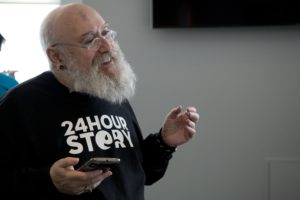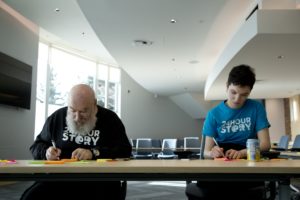It was a spring Sunday morning in 2010, a white Mazda MX-5 convertible pulled up to a curb outside my hostel in North Beach, San Francisco. On the driver’s seat was Daniel Will Harris. Daniel is an actor, author, creative writer and a writing coach. I was young and free-spirited. I had my heart set on meeting all the wonderful people in the world. Riding shotgun with a Hollywood actor and having him as my tour guide had flattered me beyond words. I put a finger to pinch my face, no, it was not a dream.
He spun his car around, making a big U-turn and slowly descending a steep street into the bustling downtown. Far in the horizon, the fiery orb of the sun was just rising above the sea. It was the beginning of a beautiful day in the city by the bay. It was also the start of our deepening friendship.
My first impression of Daniel was that he is witty, smart, intuitive, affable, exuberant, generous and creative. In fact, creative might be an understatement to describe him. I recently caught up with him in an interview to talk about his work and new life in Los Angeles. When asking him to complete the story below in less than 100 words.
“A blizzard is raging outside. Inside a nondescript abandoned house, a woman wakes up to find herself chained up in a cellar. Just seconds before she lets out a piercing scream, she hears a faint sound of footsteps descending the stairs ……… ”
Daniel’s outside the box thinking catapulted the story into 4 unexpected directions.
Daniel: “I would say this isn’t how my writing normally works, but I tell my students that anything can be a prompt–or a place to start, so I will start off in several different directions. I will give the woman a name—it is important to name your people, places and things.
Scene 1: Peggy squirms and sweats, the terror in her eyes illuminated by a single shaft of light. The footsteps grow louder. She instantly changes expressions from fear to exasperation. “I can’t work like this, Alfred,” she sighs, looking at the stairs, then the movie director. “Cut!” he yells. The caterer appears on the stairs, carrying a tray of sandwiches and tentatively whispers, “Lunch?”
Scene 2: Peggy squirms and sweats, looking around for any kind of escape. The footsteps grow closer. A very tall, gaunt man appears, smiling hideously. She turns to the spider on her shoulder and whispers, “Please save me, grandmother!” The spider leaps onto the man and sinks its fangs into him. He grabs his throat, tries to scream but nothing comes out. He falls to the floor, dead.
Scene 3: Peggy squirms and sweats, just enough to slide out of her chains. She sees a crowbar on the floor and grabs it, then wraps the chains around her again so she still looks captive. “Hello, Karen,” a deep voice says. In a flash she hits him with the crowbar, races upstairs only to find the door locked. She beats it with the crowbar until it opens, then runs, barefoot down the street into the stormy night. A car pulls up next to her. The driver smiles. She stops running, relieved. Then the driver says, “Need a lift, Karen?”
Scene 4: Peggy squirms and sweats, as the footsteps grow nearer. She knows who it is. Uncle Arthur. She’s been through this before. In a moment he’ll appear in a white chef’s uniform and announce, “I’ve made some bread for you, my dear,” knowing full well she didn’t eat carbs.
Are those good or bad? I don’t know. And that’s OK! I teach my students not to judge their writing. You don’t know if it is good or bad, and you will never know how the reader will feel about it. So, write it, then write the next thing!”
In his recent email to me, he wrote, “Swimming is like writing. It is quite easy, as long as you don’t fight”. His advice for writers, “Quiet your inner critic”. Why do we struggle with our inner critic?
Daniel: “We all have an inner critic that is meaner to us than we’d ever dream of being to other people. I don’t know why this happens to all of us, but it seems to hold true for every human being.
As writers, there’s a little nagging voice in our head telling us what we wrote is not good enough, that we should write something else, get a pizza or a lobotomy and stop writing altogether!
The main reason why people do not finish the pieces they are so excited to start is because once they get going, the inner critic starts to yell at them. They listen, stop, and never go back to finish it.
You can’t stop that inner critic voice, but you can choose to ignore it. The exercises in my book and workshop teach you to listen to your character, rather than the critic, so you can keep writing and finish your piece! It works — my students are surprised how emotionally rich and detailed their stories are, and how easily they flow.
Almost all his works entail creativity. How does he find inspiration to get the creative juice going?
Daniel: In my writing workshop and my book, I have a saying, “All you need is nothing,” because I believe the best way is to start is with nothing. Don’t try to “think of something.” Use your senses and emotions. I look, listen, smell, taste, touch and let those feelings speak to me. The trick is to accept the first thing that comes to mind and run with it rather than stopping and trying to find something “better” because if you do, you’ll keep stopping until you’re completely stopped.
I say you don’t “make it up,” you “discover it.”
Absolutely anything can be an inspiration. In my workshop, people discover how it can be something they see or hear. It can be a person, an image, music or an overheard conversation.
So, you don’t wait around for some big inspiration, instead, you pay attention to what is around you, or what is floating around in your head. You take the first thing, even if it sounds dumb at first, and you go with it, because it spoke to you for a reason and it will lead you to somewhere where you can discover more.
Ever wonder what his day is like as a writer?
Daniel: “I sleep as long as I can. Sleep is vital, as are dreams–which I write down as soon as I wake up.
I am not a morning person, and it takes me hours to get going. I am not good with schedules! I get sucked into email and learning new things on the web. When I must work with a deadline, I force myself to work on it!
Honestly, it’s rare for me to start doing creative things until around 9pm through 3am. I’m not sure why, but I’ve always been a “night owl,” and that’s when my brain starts to work. I like to think I spend the day taking in stimulation, and the night letting it inspire new creations.
Whenever I start something new, I often say to myself, “I’m just going to play with this and see what happens.” That way, I admit from the very statement, that what I do may or may not work. I give myself permission to fail. Then I can literally start playing with the work and feel free to try a lot of different angles and approaches. That gives me freedom–which leads to variety and choice.
Sometimes I’ll write the same scene several times and each time it turns out different. Now I can choose which one feels right. The same goes to my design, too, I like to come up with various designs because each time, I discover something new.
When you are being creative, a mistake can be a blessing in disguise. When something doesn’t work the way I expected, instead of saying, “That’s not right,” I can look at it and think, “Oh, that’s interesting! Let me play with that!”
I once wrote that when Columbus discovered America, he might have said, “Damn! This isn’t India! I’m going to turn around and go home.” If he had, he would have missed all the riches of the New World. If you’re too fixed on what you want to happen, then you would completely miss out on all the wonderful things you discover in the process.”
Daniel has his own way of interacting with participants in his “Write in the Now” Workshop, Here he explains what he does.
Daniel: “Participation/play. When you take my workshop, it’s your workshop. You will be doing exercises, telling stories, meeting people from around the world and having fun – because it’s all about play.
Second, Freedom. In my workshop, we celebrate failure — it’s literally the first exercise we do! It helps to be comfortable with failure (as I said before, I love mistakes), then there’s no pressure! I teach a practice, and you can use it however it works for you. Nobody can tell you how to work, only you can figure out what works for you. I offer you tools, then you can use them any way you’d like!”
Daniel is an actor and has played a range of characters in movies and TVs. Let’s hear what he thinks about acting.
Daniel: “Actors and writers usually want to play a variety of characters – because part of the joy of doing this is to experience what it’s like to be someone else. I’ve written over 500 short stories, each one from a different character’s point of view, so I get to see the world through their eyes. I’m finishing a long novel set in 1940 Manhattan and Hollywood. I was able to “escape” into those places which offer a delightful escapism for me, and hopefully the readers, too!
It is common to be “typecast” in acting, meaning you are only cast for roles that you stereotypically look like. For me it was often Santa Claus! But I could also play doctors, lawyers, judges, psychiatrists. It’s one of the great complaints you hear from actors, that they are only offered the same kinds of parts over and over.
That is why I believe actors need to create their own material. My workshop is tailored for both writers and actors – working from the character out.”
Daniel started a story podcast called “Write Now Stories”. He shared with me how he lifted the project off the ground.
Daniel: “I wanted to create a project for myself. I wrote a very strange and funny story about being locked up. Because the stories are all first-person, I had the idea of reading one, then I read another.
I have a lot of actor friends and suddenly none of them were working! It’s hard to be an actor and have nothing to do, so I contacted them and asked if they’d be so kind as to record one of my stories. I cast them, choosing the actor I thought would be best for each story. The actors were gracious with their talent, and happy to have creative work, and fun material, so they dove into the stories and added the extra depth that actors do.
My goal was to post 100. I was posting a new story every day or two. I had 100 posted by September last year, and I’m adding more, though at a slower pace because I’m working on my novel.”
What I like most about Daniel is that he always offers people hope and optimism in a whimsical sense of humor, just like the ride with him around the steep-sloped streets in San Francisco, after each excruciating climb and heart wrenching descent, there is always a beautiful scene awaiting.
Visit www.WriteInTheNow.com to learn more about his workshop, blogs and podcast.
Purchase his book here.
All photographs credit: Daniel Will Harris












good one
I look forward to reading this piece.